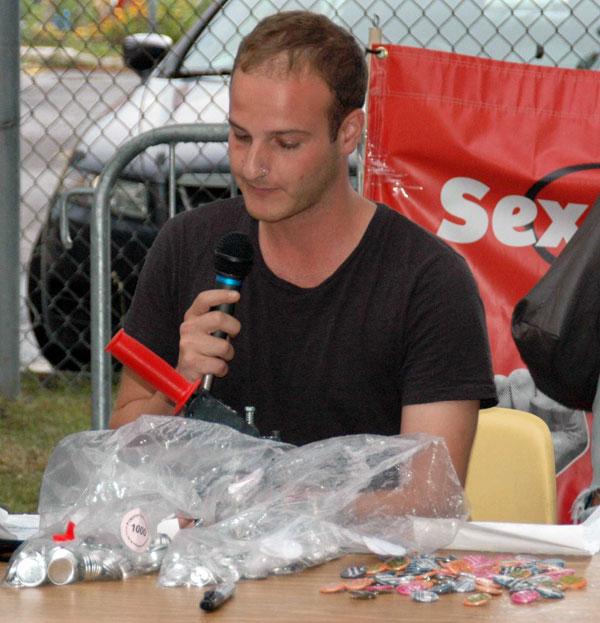Despite the rain and dreary weather, a diverse crowd of people, including children, friends and family of prisoners, gathered on Aug 10 to commemorate Canadian prisoner rights on Prisoner Justice Day at the Dalhousie Community Centre.
Organizer Tara Lyons spoke about the impact the Harper government’s tough-on-crime approach has on prisoner society.
“Inside prisons, there is a 60-percent increase in injuries and a 62-percent increase in self-harm from last year. Sadly, we’ll be seeing more deaths inside. Harper’s tough-on-crime approach, like removing two-for-one sentencing credits, only means people will just be locked up longer,” says Lyons.
AIDS Committee of Ottawa’s Zach Zimmel read a statement from a 30-year-old Ottawa man accused of not disclosing his serostatus to sexual partners. The statement describes his arrest around Mother’s Day, his interrogation by police, the public humiliation he and his family have experienced, the death threats he’s received, and details about living in protective custody:
“The true danger to society is when people fail to recognize they are oftentimes putting innocent or non-violent accused behind bars where they encounter physical, psychological and sometimes even sexual harm that is often worse than the crimes they are accused of… In my case, they also failed to recognize how my HIV-status and high-profile nature of my case would affect me behind bars. In fact, by declaring me to be a danger to society they are reinforcing myths about HIV and as well as reinforcing social stigma associated with the disease.”
Matt Morgan-Brown, of the Ottawa Movement Defense organization, spoke on behalf of Roger Clermont, an Ottawa man convicted last fall and sentenced to four years for the May 2010 Glebe RBC bank firebombing. Morgan-Brown was also arrested and detained in connection with the incident.
“For people who don’t know Roger, he’s a communist. It’s one of the things he’s very emphatic about, and it is something that was not well covered. One of the things we want to clarify with Ottawa Movement Defense is supporting Roger does not necessarily mean supporting burning down banks. It’s about supporting a prisoner. It’s a matter of principle… just like other prisoners, he deserves support. This is one of the primary ways that the state tries to control us, stop resistance and smash our movements,” says Morgan-Brown.
Also in the audience was Catherine, of the Canadian Association of Elizabeth Fry Societies, who is not allowed to provide her last name. She says the prison system creates violent people.
“The majority of prisoners are there because of poverty-related issues and not violence. Yet they become increasingly violent when they’re in the prison system. The prison system tries to say these people had criminal and violent tendencies from the get-go. No. If you’re put into a situation where there’s constant overcrowding, malnourishment, inadequate health and psychological care, and you’re separated from everything you’ve known and loved, like your family, friends, job, anything you have… There’s no doubt you can become violent and it’s not your fault,” says Catherine.
Prisoner Justice Day began as a commemoration of Eddie Nalon, a prisoner who bled to death Aug 10, 1974, in a segregated unit of Millhaven Maximum Security Prison in Bath, Ontario. On the first anniversary of Nalon’s death, Millhaven prisoners refused to work; they held a memorial service and organized a one-day hunger strike, disregarding their fear of being pushed into solitary confinement. A year later, some of the alleged protest leaders were still in segregation.

 Why you can trust Xtra
Why you can trust Xtra


